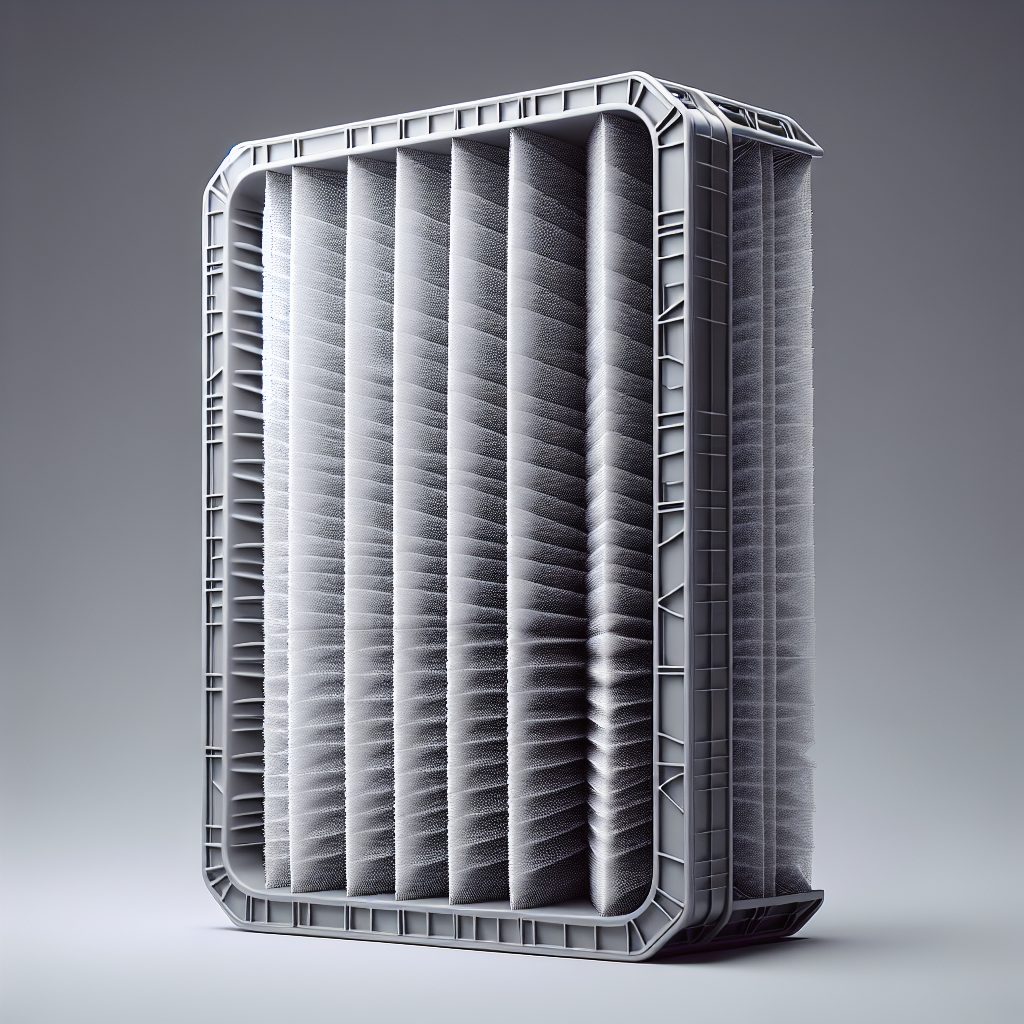
HEPA filters are specialized kinds of air filtration systems designed to remove at least 99.97% of particles as small as 0.3 microns from the air that passes through them. These filters are well known for their superior air cleaning capabilities and can be used both in residential and commercial environments. HEPA filters trap airborne impurities such as pollen, dust mites, and animal fur which can cause allergies and asthma, as well as other minute particles and vapors like those found in chemical fumes.
Beyond their health related application, HEPA filters also have a number of other uses. For instance, they are frequently utilized in healthcare facilities to prevent the spread of airborne pathogens, as well as in the electronics industry to prevent the accumulation of dust particles on sensitive electronic components. Many commercial vacuum cleaners use HEPA filters to increase the efficiency of their systems by trapping the finest dust particles that other filtration systems miss. The importance of HEPA filters has led to their popularity and widespread use in many different fields. In the next section, we will look at the three main benefits of investing in a HEPA filter for your home or business.
Key Takeaways
1. HEPA (High-Efficiency Particulate Air) filters are an important component of air purifying systems, used in many different areas including industries, households, and hospitals.
2. HEPA filters help to reduce airborne particulate matter, pollen, and other contaminants.
3. HEPA filters are rated based on their ability to capture particles, ranging from 0.1 to 10 microns.
4. HEPA filters are classified into multiple categories including mechanical, electrostatic, and hybrid filters.
5. Cleaning and replacing HEPA filters is a critical part of air purification systems in order to maintain optimal performance and efficiency.
What Are HEPA Filters?
HEPA (High Efficiency Particulate Air) Filters are air filters designed to capture very small particles, including dust, pollen, mold spores, smoke and pet dander, before they can be dispersed into the air. HEPA filters can dramatically reduce indoor air pollution and improve air quality, especially for people who suffer from asthma or allergies.
How Do HEPA Filters Work?
HEPA filters are made from high-density synthetic fiber, which are heavily tested and certified to meet certain regulations. The fibers are arranged in a random network that is designed to trap the tiny particles and keep them from passing through the filter. As air passes through the filter, particles larger than 0.3 microns (about 1⁄250,000 of an inch) are caught and retained in the densely woven network of fibers.
Benefits of Using HEPA Filters
HEPA filters are designed to capture a wide range of particles, ranging from dust and pollen to mold spores and other allergens. This makes HEPA filters an excellent choice for people who suffer from allergies or asthma. They can also drastically reduce indoor air pollution, which can lead to improved respiratory health, better sleep, and reduced stress.
Similarly, using HEPA filters can help improve the indoor air quality of pet owners, as the filter can capture pet dander and various types of allergens. HEPA filters also have the added benefit of reducing noise levels.
Maintenance of HEPA Filters
HEPA filters should be replaced or cleaned regularly to maintain proper performance. Cleaning filters involves removing them from their casing and vacuuming, or even washing them with detergent-water if they are washable. After cleaning, the filter must be completely dry before being reinstalled.
Replaceable filters should be replaced every 3-6 months or according to the manufacturer’s instructions. It is important to change filters regularly in order to maintain their effectiveness.
5 Tips for Using HEPAFilters
1. Follow the manufacturer’s instructions for installation and maintenance
2. Replace or clean the filter every 3-6 months depending on the filter type
3. Vacuum or wash HEPA filters regularly
4. Consider using a pre-filter to extend the life of the HEPA filter
5. Use a purifier with an activated carbon filter to help remove odors and pollutants from the air
What are HEPA Filters?
HEPA Filters are short for High-Efficiency Particulate Air Filters. They are used to filter out particulates in the air such as dust, pollen, pet dander, smoke, and other airborne pollutants. HEPA Filters are highly effective at capturing extremely small particles from the air that are too small for the human eye to see. These filters are also tested and certified to meet a set of standards defined by the U.S. Department of Energy.
What are the Benefits of HEPA Filters?
HEPA Filters have numerous benefits, most notably the ability to capture up to 99.7% of airborne particles, including dust, allergens, bacteria, mold, pollen, and smoke. This eliminates the need to constantly clean and dust the home or workplace. Furthermore, these filters are also known for improving air quality, reducing indoor allergens, and increasing energy efficiency.
Are HEPA Filters Safe?
Yes, HEPA Filters are considered safe for most households and workplaces. Additionally, most HEPA Filters are using safe materials, such as fiberglass and option, in the production process. Yet, those sensitive to allergens should use additional caution when using these filters.
How Often Should I Replace My HEPA Filter?
The answer to this depends on several factors: the type of filter, the size of the area being filtered, the environment surrounding the filter, and the amount of particulate matter in the air. Generally, most filters should be replaced every 6 months to a year. However, it is best to refer to the manufacturer’s instructions for more specific instructions.
What is the Difference Between a MERV Rating and a HEPA Filter?
A MERV Rating (Minimum Efficiency Reporting Value) is an indication of how effective a filter is at capturing particles in the air. A HEPA Filter is simply a type of filter that is rated to meet MERV requirements for particle filtration. Therefore, a HEPA Filter is one type of filter with a MERV rating.
Does a HEPA Filter Remove Odors?
No, HEPA Filters are designed to capture particulates, not odors. For odor removal, you will need to look for a filter with a carbon layer, which will absorb and remove odors from the air.
What Should I Look for When Shopping for a HEPA Filter?
When shopping for a HEPA Filter, make sure to look for a product that is certified by the U.S. Department of Energy. Additionally, look for a product that has been independently tested and rated, as well as one that is compatible with the air-conditioning system in your home or workplace.
Do All HEPA Filters Produce an Ozone Emission?
No, not all HEPA Filters produce an ozone emission. The type of filter you choose and the environment in which the filter is used can both influence the ozone emission. In most cases, ozone emissions are very minimal and unlikely to cause negative health effects.
Can HEPA Filters Be Recycled?
Yes, many manufacturers now offer recycling options for used or expired HEPA Filters. Some manufacturers may even offer a rebate for recycling your filter. However, it is important to research local recycling options prior to disposing of your filter.
What is the Difference Between True HEPA and High-Efficiency Particulate Air (HEPA-Type) Filters?
True HEPA Filters are designed to meet specific standards set forth by the U.S. Department of Energy. These filters remove 99.97% of all particles greater than 0.3 microns in size from the air. Conversely, HEPA-Type Filters are designed to meet less stringent requirements, removing 99% of all particles greater than or equal to 1 micron in size.
Final Thought
HEPA Filters can be a great tool to add to your home or workplace, helping to improve air quality, reduce indoor allergens, and increase energy efficiency. However, it is important to research the options to find a filter that is compatible with your air-conditioning system and meets the standards set forth by the U.S. Department of Energy. Additionally, look for filters with additional features such as odor removal for more comprehensive protection.
While you should always research the latest recommendations from the U.S. Department of Energy, as a general rule of thumb you should always replace your filter at least once per year, although this timeline may differ depending on the type and size of filter.



